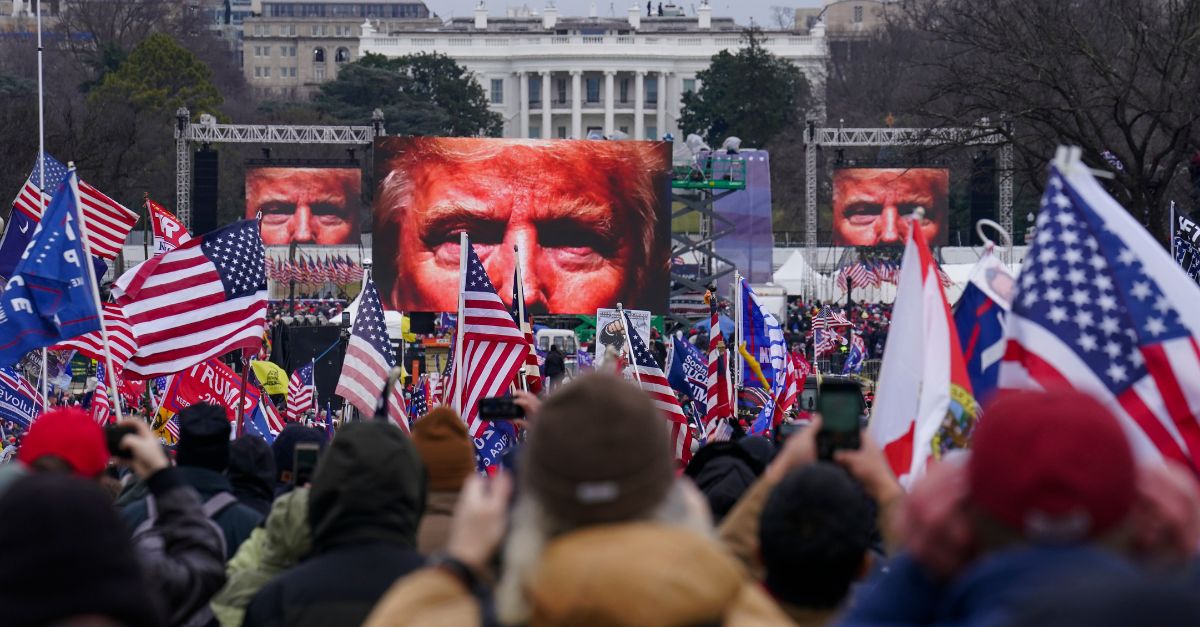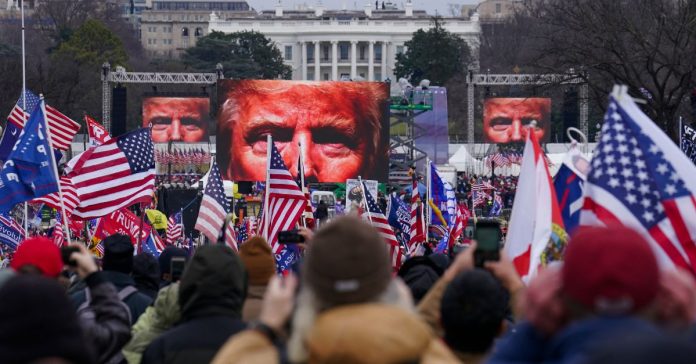
Donald Trump supporters participate in a rally in Washington, Jan. 6, 2021, that some blame for fueling the attack on the U.S. Capitol. (AP Photo/John Minchillo, File)
With the floodgates on civil lawsuits from police seeking to hold Donald Trump liable for Jan. 6 flung open — and with arguments over his immunity pending before the U.S. Supreme Court — the former president has asked a federal judge in Washington, D.C., to stay civil litigation brought against him invoking the riot at the U.S. Capitol, arguing that “overlap” in civil discovery would violate his rights to a fair criminal trial.
As Law&Crime previously reported, this move was signaled in a joint status report filed earlier in March.
The motion comes as Trump nonetheless claims he is totally immune from prosecution anyway and as more than 1,000 people have faced prosecution for crimes connected to the attack at the Capitol, with more than 200 defendants blaming him directly for inciting them.
The former president’s attorneys made the latest bid to hold off more legal drama on Tuesday in the case of Lee v. Trump, a consolidated series of civil lawsuits brought by a group of lawmakers, as Law&Crime previously reported, in their individual capacity.
The lawmakers include the chairman of the now-defunct House Select Committee to Investigate the January 6th Attack on the U.S. Capitol, Bennie Thompson, California Reps. Karen Bass, Barbara Lee, and Maxine Waters, Steve Cohen of Tennessee, Bonnie Watson Coleman of New Jersey, Veronica Escobar of Texas, Hank Johnson, Jr. of Georgia, Marcy Kaptur of Ohio, Jerry Nadler of New York, and Pramila Jayapal of Washington. They allege that Trump, his former attorney and ally Rudy Giuliani, and far-right groups such as the Oath Keepers and Proud Boys had “conspired to incite an assembled crowd to march upon and enter the Capitol of the United States for the common purpose of disrupting the counting of Electoral College votes on Jan. 6.”
This was a violation of the Civil Rights Act of 1871, also known as the Ku Klux Klan Act, the plaintiffs argued in an amended April 2021 civil complaint.
Trump’s four-count indictment in his criminal case in Washington, D.C., brought in August, included a charge under the Ku Klux Klan Act, with Special Counsel Jack Smith alleging Trump criminally violated Americans’ constitutionally protected right to cast their votes free of intimidation.
“The Government has brought four charges against President Trump in the D.C. case, which carry a maximum penalty of decades in prison,” Trump’s attorney David Warrington wrote in a March 19 motion before U.S. District Judge Amit Mehta, a Barack Obama appointee. “These are serious potential consequences for any criminal defendant. Given the ‘co-extensive’ nature of the allegations in this case with those in the criminal matter, this factor weighs decisively in favor of staying these proceedings.”
He continued: “Given the substantial overlap in factual and legal allegations between these cases and the D.C. criminal case, there is also a substantial risk that proceeding in this matter now will ‘expose the defense’s theory to the prosecution in advance of trial.’ This would prejudice President Trump’s ability to effectively defend himself in both these civil cases and the Special Counsel criminal matter.”
An added benefit to staying civil proceedings, Warrington wrote, would be the streamlining of discovery, including immunity discovery, which Trump’s lawyer notes is a “large amount.”
The attorney also suggested Trump may be deprived of invoking his Fifth Amendment privilege if the civil cases are allowed to continue.
“While President Trump would be entitled to a presumption of innocence during his criminal trial that would include preventing any judge or jury from inferring any negative connotation from his invocation of his Fifth Amendment rights, should he choose to invoke such rights, the same is not true in a civil case. Rather, in a civil case, inferences may be drawn against a defendant who asserts his Fifth Amendment rights. Allowing such an inference against President Trump — or any litigant — in the event he asserted such rights during an ongoing criminal trial would unfairly require them to choose between their Fifth Amendment protection or civil litigation,” Warrington wrote.
The very “appearance of justice is often as importance as justice itself,” he added.
If Trump is hampered in the civil litigation, or forced to choose between presenting his “strongest defense,” that appearance would be “damaged.”
And though the former president is actively pursuing the total dismissal of his criminal prosecution in Washington, his attorney says it is “in the public interest to allow President Trump to defend the criminal proceeding against him without the burden of this case.”
The “extraordinary impact on our Nation as a whole” was also provided as a reason to stay.
It was also Mehta who presided over the criminal trials of key Oath Keepers and Proud Boys charged with seditious conspiracy, many of whom were the extremists lawmakers pointed to in their own civil claims. As Law&Crime has previously noted, Mehta will not just have to rule on this motion to stay in the civil case, but he will also soon need to address whether Trump’s speech from the Ellipse on Jan. 6 was an official act of his presidency, or if it was closer to a stump speech for his reelection campaign.
Meanwhile, Trump’s criminal trial in Washington, D.C., is on ice until a resolution on Trump’s immunity is made by the Supreme Court. Oral arguments will be held April 25, as Law&Crime previously reported.
Have a tip we should know? [email protected]

